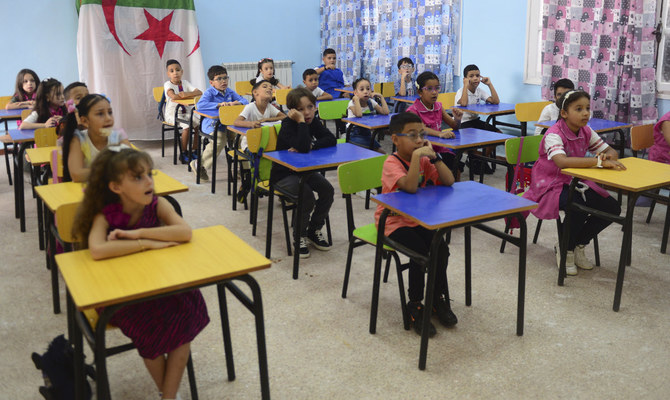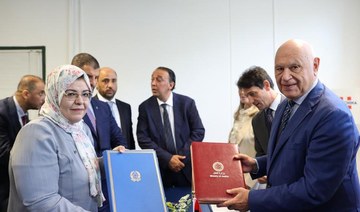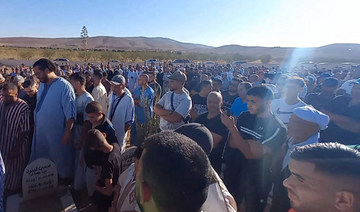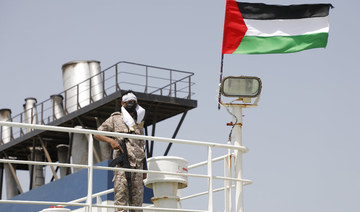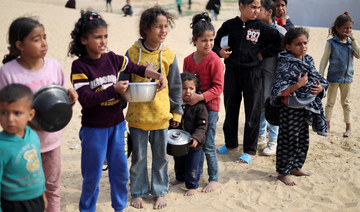ALGIERS: More than a year after Algeria launched a pilot program to teach English in elementary schools, the country is hailing it as a success and expanding it in a move that reflects a widening linguistic shift underway in former French colonies throughout Africa.
Students returning to third and fourth-grade classrooms this fall will participate in two 45-minute English classes each week as the country creates new teacher training programs at universities and eyes more transformational changes in the years ahead. Additionally, the government is strengthening enforcement of a preexisting law against private schools that operate primarily in French.
“Teaching English is a strategic choice in the country’s new education policy,” Education Minister Abdelkrim Belabed said last week, lauding the move as an immense success.
English is the world’s most widely spoken language, accounts for the majority of content on the internet, and remains a lingua franca in business and science. As France’s economic and political influence wanes throughout Africa, Algeria is among a longer list of countries gradually transitioning toward English as their primary foreign language.
This year, neighboring Mali changed its constitution to remove French from its list of official languages, and Morocco made English classes compulsory in high schools.
Algeria has more French speakers than all but two nations — France itself and the Democratic Republic of the Congo. According to the International Organization of the French Language, nearly 15 million out of the country’s 44 million speak it. Its officials frame English classes as a practical rather than political shift, noting the language’s importance in scientific and technical fields.
But questions about France’s position in Algerian society have long been polarizing, as teachers and former education policy officials acknowledge.
Retired high school principal Mohammed Arezki Ferdi believes Algeria should have begun the shift to English decades ago.
The current initiative was launched by Algerian President Abdelmadjid Tebboune, who came to power in 2019.
Previous leaders also tried to expand English but failed to overcome the French-educated elites who had long wielded power in the country.
“We lost a lot of time,” Ferdi said.
“We should have introduced English in primary schools when President (Abdelaziz) Bouteflika laid out his reform after coming to power in 1991. But at that time, French-speaking factions in Algeria had a lot of decision-making power in institutions.”
The expansion of English language learning comes as tensions increasingly flare between France and Algeria.
The two share security interests over the political upheavals shaping contemporary West Africa.
However, in recent years, they have sparred repeatedly over immigration, extradition, and how each country memorializes colonialism and the brutal war that resulted in Algeria’s independence in 1962. Algeria plans to expand its current program to fifth grade next year.
It will continue instructing students in French for three hours each week in elementary schools.
When English-language learning was introduced last year, Algerian officials reaffirmed their commitment to French and said it would continue to be taught widely.
But in remarks this week at the beginning of the school year, Kamal Bedari, Algeria’s minister of Higher Education, said expanding the program was to enable elementary school students to take technical courses later on in English — not French.
Though few dispute that English is essential, some worry about how Algeria is implementing such a shift and caution against declaring victory too soon. Ahmed Tessa, a former adviser to Algeria’s Ministry of Education, believes getting students to master English can only happen gradually and will likely require more than simply adding classes.
“We need to get back to basics,” he said. “This is no small task.”
Regardless of how quickly schools transition to English, signs of pushback against French are clear elsewhere.
Authorities have slowly replaced French with English in the official titles of various government ministries. And on his trip last year to Algiers, the country had French President Emmanuel Macron provide remarks from a podium noting his title and the date in English and Arabic, one of Algeria’s two official languages, along with indigenous Tamazight.



